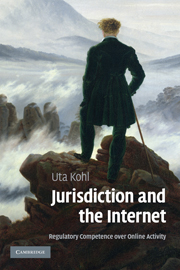Book contents
- Frontmatter
- Contents
- Preface and acknowledgments
- Table of cases
- Table of statutes, regulations, directives and treaties
- 1 Jurisdiction and the Internet
- 2 Law: too lethargic for the online era?
- 3 The tipping point in law
- 4 Many destinations but no map
- 5 The solution: only the country of origin?
- 6 The lack of enforcement power: a curse or a blessing?
- 7 A ‘simple’ choice: more global law or a less global Internet
- Bibliography
- Index
5 - The solution: only the country of origin?
Published online by Cambridge University Press: 18 July 2009
- Frontmatter
- Contents
- Preface and acknowledgments
- Table of cases
- Table of statutes, regulations, directives and treaties
- 1 Jurisdiction and the Internet
- 2 Law: too lethargic for the online era?
- 3 The tipping point in law
- 4 Many destinations but no map
- 5 The solution: only the country of origin?
- 6 The lack of enforcement power: a curse or a blessing?
- 7 A ‘simple’ choice: more global law or a less global Internet
- Bibliography
- Index
Summary
The exclusive country-of-origin approach
Online publishers have argued that – instead of looking to the destinations of their online activities to determine their legal exposure (i.e. adjudicative and/or legislative jurisdiction) – regulatory competence should only lie with the State where their activities originate. They argue that it should only be their home State where for legal purposes a website is ‘published’, a trademark is ‘used’, an advertisement or offer for sale is ‘displayed’, an online contract is ‘concluded’ and so on. The distinct advantages would be that online publishers could easily foresee their legal exposure and the regulatory burden would be realistic. It is a simple principle which creates predictability and certainty for all concerned, and the ‘origin’ State is able to enforce its laws against the local publisher and would not be plagued by the enforcement problems faced by ‘destination’ States. These are persuasive arguments and, yet, as the discussion in previous chapters and below shows, the times when they have found fertile ground are few and far between. States have on the whole not been prepared to forego regulatory competence in favour solely of the State of origin.
This is not to say that the States of origin have not asserted regulatory control over local online publishers. They have, but they have not done so exclusively. Online publishers are generally subjected to the laws of both where their activities originate and where their activities have an effect (the latter at least in principle).
- Type
- Chapter
- Information
- Jurisdiction and the InternetRegulatory Competence over Online Activity, pp. 164 - 198Publisher: Cambridge University PressPrint publication year: 2007

